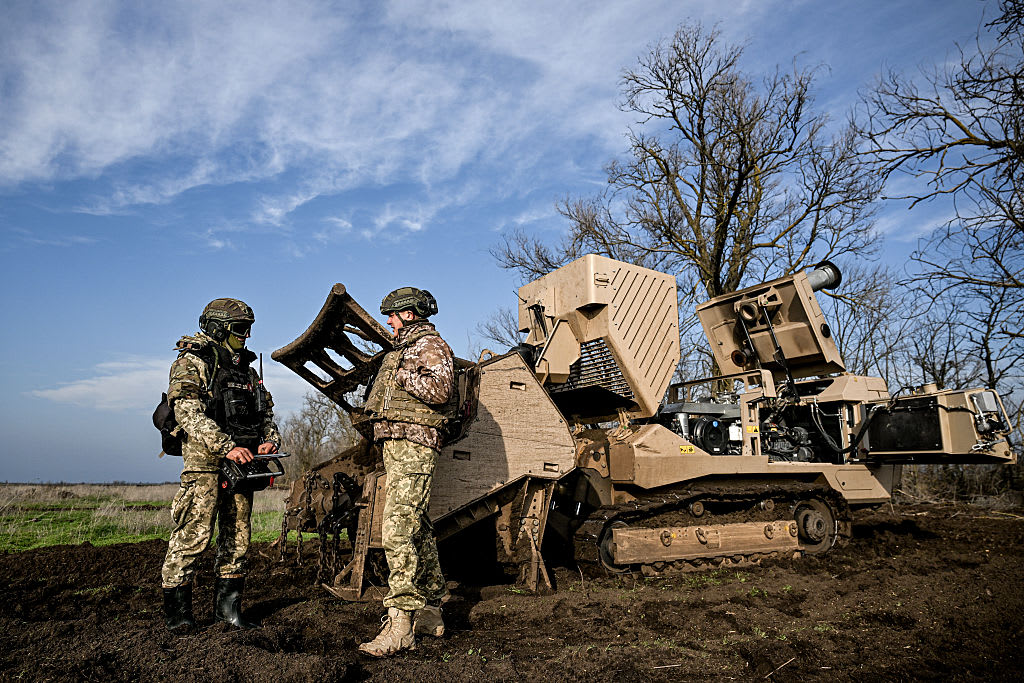Stocks climb after Russia says it pulled back some troops on Ukraine border
Stocks jumped Tuesday after Russia's Ministry of Defense said that some of the forces the country had massed around the Ukraine border were being pulled back to their bases. Western officials, however, were in no rush to accept the remarks as an indication that Russia is de-escalating.
The S&P rose 1.6% to 4,471.07, while the Dow was up 1.22% at 34,988.84. The tech-heavy Nasdaq Composite advanced 2.5% — it's highest in two weeks.
"Markets rallied following reports that Russia is returning some troops, fueling optimism that tensions are easing," TD Securities analysts said in a report.
That optimism is laced with skepticism by analysts who caution that despite this week's headlines of Russian troop withdrawals, the potential for conflict in Eastern Europe remains high.
"The length of time Russia is willing to devote to these efforts remains unclear," Raymond James analyst Ed Mills and Tavis McCourt said in a February 15 report, adding that "ground developments will be the more reliable indicators in the days and weeks ahead."
Russian Foreign Minister Sergey Lavrov signaled Monday in a made-for-television meeting with President Vladimir Putin that Moscow would keep talking about the security grievances that have led to the Ukraine crisis.
Russia denies it plans to invade but has massed more than 130,000 troops on Ukraine's borders. The comments raised hope that war could be averted even as the U.S., Britain and other allies warned troops could move on Ukraine as soon as Wednesday.
Markets were spooked Monday after the U.S. said it was closing its embassy in Ukraine and moving all remaining staffers there to a city near the Polish border.
"For the time being, we continue to see an invasion as more likely than not but are watching for face-saving de-escalation options for Putin," Height Securities Benjamin Salisbury told investors in a report.
Eye on Federal Reserve
At the same time, investors have been trying to gauge how stocks and the broader economy will be affected by the Federal Reserve's move to raise interest rates to quell surging inflation.
The central bank is expected to start raising its benchmark interest rate in March and Wall Street expects as many as seven rate hikes this year after last week's report that inflation jumped 7.5% in January from a year ago, the fastest increase in four decades.
However, analysts now say the added threat of disruption posed by the situation in Ukraine, may lead the Fed to postpone its plans.
"With the backdrop of market disruption, elevated geopolitical risk could place doubts on the Fed's ability to raise the federal funds rate as the situation unfolds, possibly scaling back expectations for the number and speed of rate hikes for 2022," Raymond James analysts Mills and McCourt.
Investors also have their eye on the latest round of corporate earnings, in part to get a better understanding of how companies are dealing with high inflation. Some of the more notable U.S. companies reporting earnings this week include Airbnb on Tuesday, DoorDash on Wednesday and Walmart on Thursday.
This week also brings updates on inflation and how that might be impacting consumer spending. The U.S. Labor Department will release its January report for prices at the wholesale level on Tuesday and the Commerce Department will release its January retail sales report on Wednesday.
In energy trading, benchmark U.S. crude lost $2.61 to $92.85 a barrel in electronic trading on the New York Mercantile Exchange. It climbed 2.5% on Monday, while natural gas prices jumped 6.4%. Russia is a major energy producer and military action that disrupts supplies could jolt markets and global industries. According to Savi Syth, airline analyst at Raymond James,"Airlines will see pressure on higher oil prices."
Brent crude, the international pricing standard, fell $2.27 to $94.21 a barrel.



